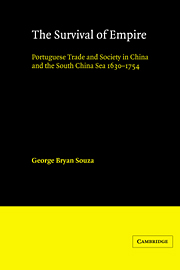Book contents
- Frontmatter
- Contents
- List of figures, maps and tables
- Glossary
- Notes on spelling and currency, weights and measures
- Preface
- 1 Maritime trade in Asia
- 2 Imperial foundations: the Estado da India and Macao
- 3 Population, personalities, and communal power
- 4 Country traders and Crown monopoly
- 5 Merchants and markets
- 6 Country traders and the search for markets
- 7 Imperial relations: Macao and the Estado da India
- 8 Imperial survival: Sino-Portuguese relations from Ming to Ch'ing
- 9 Macao, Companies and country traders: the other Europeans in China
- 10 Conclusion
- List of abbreviations and notes
- Primary Sources
- Bibliography
- Index
- Frontmatter
- Contents
- List of figures, maps and tables
- Glossary
- Notes on spelling and currency, weights and measures
- Preface
- 1 Maritime trade in Asia
- 2 Imperial foundations: the Estado da India and Macao
- 3 Population, personalities, and communal power
- 4 Country traders and Crown monopoly
- 5 Merchants and markets
- 6 Country traders and the search for markets
- 7 Imperial relations: Macao and the Estado da India
- 8 Imperial survival: Sino-Portuguese relations from Ming to Ch'ing
- 9 Macao, Companies and country traders: the other Europeans in China
- 10 Conclusion
- List of abbreviations and notes
- Primary Sources
- Bibliography
- Index
Summary
The survival of empire or rather the survival of a Portuguese community and its society in China in the late seventeenth and early eighteenth centuries suggests that the nature of Portuguese colonial society and its contribution to the maritime trade of Asia require a re-evaluation of their significance. The Portuguese imperial experience in Asia may be approached from the Crown's or the casados perspective. Regardless of temporary successes of talented fidalgo administrators and the gains for the state, and individuals involved throughout the Estado da India for the Crown, the empire appears to have been an abject failure in financial and political terms but it was a responsibility that was retained for prestige, honour, religion and the elusive hope for gain that the Crown would not relinquish.
For the casados, whether reinol or mestico, whose activities as ship-owners, operators and investors in the country trade are very much a central focus of this study, and the society that they created and maintained in China, the empire was less of a failure than for the Crown. Governors, judges and other Crown-appointed administrators arrived at Macao from Portugal or India recognising that their stay was short and invariably departed complaining of the intransigence of the casados towards the Crown's authority. Casados, lacking some of the fidalgos attitudes, did not possess the same mobility; married or living with a concubine, the Macao country traders knew from a very early date that their community's existence rested upon their imposing or maintaining good relations with Chinese merchants and officials and also upon their taking advantage of the trading opportunities in south China, the South China Sea and the Indian Ocean.
- Type
- Chapter
- Information
- The Survival of EmpirePortuguese Trade and Society in China and the South China Sea 1630–1754, pp. 226 - 230Publisher: Cambridge University PressPrint publication year: 1986

